
Biosystems Engineering Applications for Quality Food Production
Apple Academic Press Inc. (Verlag)
978-1-77491-668-1 (ISBN)
- Lieferbar (Termin unbekannt)
- Versandkostenfrei
- Auch auf Rechnung
- Artikel merken
Biosystems engineering as an integrated science combines the fields of engineering design and analysis with biological sciences to provide solutions for food production and processing problems. Since food production is an ever-growing, constantly changing food engineering frontier, it is faced with a range of dynamic problems. This new book, Biosystems Engineering Applications for Quality Food Production: Waste Valorization and New Product Development, shows how the two areas of biosystems engineering and food industry come together in an interdisciplinary way to offer solutions to these problems.
The book presents the most recent advances in these two areas, ranging from the use of biodigesters, bioremediation of effluents from the food industry, use of microorganisms to produce polymers and their applications, waste recovery, new products development, new applications for new varieties of crops, replacement of fats in food, improvement in bovine production, and production and harvesting microalgae and cyanobacteria. It includes current topics that include the application of biosystems for food processing, the revaluation of agro-industrial waste, bioremediation systems, as well as new trends in the development of food from start to finish. The book also discusses the generation of value-added products and new functional foods.
This informative book is a compendium of the use and application of biosystems in the food industry—from primary production to processing, waste evaluation, and bioremediation, that is, an integral food production system. As such, the book will serve as a guide for those involved in the fields of biotechnology and agricultural sciences. It will also prove useful for undergraduate and postgraduate students and those in the agro-industrial sector.
Romeo Rojas, PhD, is Professor at the School of Agronomy, Autonomous University of Nuevo León, Mexico, as well as Coordinator of the Research Center and Development for Food Industries. His research and teaching are in food, biotechnology, and agricultural sciences. Dr. Rojas is currently working on several research and collaboration projects funded by the Agricultural Secretariat of Mexico, the National Forestry Commission, and the National Mexican Research Council. He has published over 20 original research papers in indexed journals and 16 book chapters and has participated in and contributed to over 50 scientific meetings. He is a member of the Mexican Society of Biotechnology and Bioengineering (SMBB), the National System of Researchers (SNI) (since 2015 [level I]), and other organizations. He directed one PhD thesis, two MSc theses, and four BSc theses. Dr. Rojas became a Food Science and Technology Engineer (2007) from the Autonomous Agrarian University Antonio Narro, with specialization in agricultural sciences. His PhD degree in Food Science and Technology was awarded in 2013 by the Autonomous University of Coahuila, Mexico. He has had academic research stays in Portugal (Univeridade do Minho) and in Queretaro, México (Universidad Nacional Autónoma de Mexico). Guillermo Cristian Guadalupe Martínez-Ávila, PhD, is Professor at the School of Agronomy, Autonomous University of Nuevo León, Mexico, specializing in research on foods, biotechnology, and agricultural sciences. Dr. Martínez-Ávila has published 24 original research papers in indexed journals and 10 book chapters and has participated in and contributed to over 50 scientific meetings. He was named as an outstanding reviewer for journals such as Food Research International, Heliyon, LWT-Food Science and Technology, etc. He is a member of the National System of Researchers (since 2012 [level 1]), Mexican Society of Biotechnology and Bioengineering, and Mexican Association of Food Chemistry. He has been a thesis director of two MSc theses and three BSc theses. Dr. Martínez-Ávila has collaborated and worked on several research projects funded by the Agricultural Secretariat of Mexico, National Forestry Commission and the National Mexican Research Council (SAGARPA-CONACYT; CONAFOR-CONACYT). He became a Chemical Pharmacobiologist (2005) at the Autonomous University of Coahuila, Mexico, and holds a specialization in food sciences. His PhD degree in Biotechnology was awarded in 2011 by the Autonomous University of Coahuila. He has been in two academic stays in Ireland (University College Cork) and in Fortaleza, Brazil (Universidade de Fortaleza). Nancy del Pilar Medina Herrera, PhD, is a full-time Professor in the Agronomy School at Autonomous University of Nuevo Leon, Mexico, in the field of bioprocess systems engineering. Her areas of interest include mathematical modeling, simulation, design, and optimization. She is a member of the National Research System (Mexico) since 2016 and was awarded the desirable profile by PRODEP-SEP in 2019. She has a prolific engineering background in technological devices, equipment, process, and systems. She has contributed to 20 JCR documents, scientific articles, and book chapters in the bioprocess system engineering area. Dr. Medina Herrera has also participated in 20 national and international professional meetings.
1. Phytochemicals from Pomegranate Peel: A Source of Antioxidants for Vegetable Oil-Based Oleogels 2. Proximal Analysis and Energy Content of the Base Materials of the Pericarp of Pecan (Carya illinoinensis W.) 3. Circular Economy Applied to the Use of Agri-Food Waste to Obtain Products with Added Value 4. Production and Harvesting Microalgae: Opportunities and Challenges 5. The Use of the Cyanobacteria Spirulina as a Supplementary Protein in Human Nutrition 6. Microalgae and Cyanobacteria as Sustainable Food Sources for Animal Feed 7. Preparation of Kombucha from Agro-Industrial Wastes to Produce Microbial Cellulose 8. Fermented Beverages from Agro-Industrial Wastes and Nonconventional Sources 9. Circular Economy Practices in Agroindustry: From Waste to Bioactive Compounds 10. Valorization of Ataulfo Mango By-Products as a Source of Value-Added Bioactive Compounds 11. Antioxidant Activity of Polyphenolic Compounds Obtained from Pigmented Maize (Zea mays L.). 12. Food Products Based on Candelilla Wax Oleogels
| Erscheinungsdatum | 22.11.2024 |
|---|---|
| Zusatzinfo | 47 Illustrations, black and white |
| Verlagsort | Oakville |
| Sprache | englisch |
| Maße | 156 x 234 mm |
| Themenwelt | Technik ► Lebensmitteltechnologie |
| ISBN-10 | 1-77491-668-1 / 1774916681 |
| ISBN-13 | 978-1-77491-668-1 / 9781774916681 |
| Zustand | Neuware |
| Haben Sie eine Frage zum Produkt? |
aus dem Bereich


